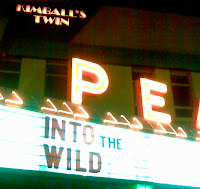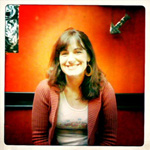I now walk into the wild
 This past weekend, Into The Wild finally trickled down to those of us not located in big glamorous cities. I promise not to wreck it for you if you haven’t read the book or seen the movie, these are just a few of my thoughts after having done both this past week.
This past weekend, Into The Wild finally trickled down to those of us not located in big glamorous cities. I promise not to wreck it for you if you haven’t read the book or seen the movie, these are just a few of my thoughts after having done both this past week.
Components of McCandless’ grand Alaskan adventure tug relentlessly and almost perniciously at some loose threads inside me. I suspect that elements of following your passion with such unbridled drive and joy touch many of us on some level, which is why the book sold so well, and why the movie was made. I was glad I had read the book first, shading the characters, the motivations, filling in the missing chunks, but the movie was very faithful to the book.
The movie review in our local paper said that McCandless was “sanctimonious and arrogant,” and that sat so wrong with me. I surely didn’t know McCandless, and it’s easy to forget after the book and the film and a big-name soundtrack that he was actually a real person. But more than anything to me, he seemed sincere, even if the misguided optimism about his odds of success in the wild ended up fatal.
As one interviewee in the book named Sleight said, while relating Chris with another wilderness wanderer who was profiled named Everett Ruess: “Everett was strange, kind of different. But him and and McCandless, at least they tried to follow their dream. That was what was great about them. They tried. Not many do.” That, for me, was the core of the story.
I noticed that McCandless seemed to deeply affect everyone whose lives he came into, like a bolt of lightning. Everyone interviewed for the book remembered him well, much better than your standard vagrant who enters your life for a few hours or days, for a meal or a ride. But you know, I found myself empathizing with the people that McCandless left behind at every stop along the way, after he took what he needed from them — be it conversation, a father figure, travel advice, a laugh, a discussion of literature, the bouncing off of ideas and philosophical concepts. Like a blue-green bolt of ephemeral electricity he lit up their skies for a moment. But very soon, the wanderlust inside him compelled him to travel on. Everyone seemed to feel a gaping void there after Chris left, something you see especially vividly in the movie. Maybe he’s one of those shooting stars that you almost wish you’d never crossed paths with at all because everything seems dimmer in their absence, the afterglow they leave behind radiating off the otherwise dull grey walls around you.
 How does the music complement the film? Very well, as I suspected. Vedder’s scoring is bittersweet and powerful, especially a memorable scene with “The Wolf,” where Vedder sounds his barbaric yawp over the roofs of this world (or actually the treeline of the Alaskan wilderness) as McCandless stands with arms outstretched on top of his bus-home, feeling the pull and glory of the wilderness. Vedder’s unselfconscious animal cries made the little hairs stand up on the back of my neck.
How does the music complement the film? Very well, as I suspected. Vedder’s scoring is bittersweet and powerful, especially a memorable scene with “The Wolf,” where Vedder sounds his barbaric yawp over the roofs of this world (or actually the treeline of the Alaskan wilderness) as McCandless stands with arms outstretched on top of his bus-home, feeling the pull and glory of the wilderness. Vedder’s unselfconscious animal cries made the little hairs stand up on the back of my neck.
One specific lyric on the soundtrack that I keep rolling around in my mind is found in the song “Guaranteed.” Vedder sings “Circles they grow and they swallow people whole…” I keep thinking of what he may have meant by this line. I come up with more than one circle. Anyone who has ever found a certain idea hard to leave behind knows the exhaustion that comes with continuing to revisit it, as it soaks up the attention and the circle gets stronger in our minds. I wonder if McCandless escaped the beige circles of mediocre daily living, only to find himself pursuing a more savage circle of Alaskan wilderness. Both will swallow you whole.
Which one is worse?
Guaranteed – Eddie Vedder
Now that I am done reading Into the Wild, I have moved on to Cormac McCarthy‘s The Road and it is currently scaring the absolute bejesus out of me with its incinerated post-apocalyptic vision. More on that later but sheesh.



 Name: Heather Browne
Name: Heather Browne